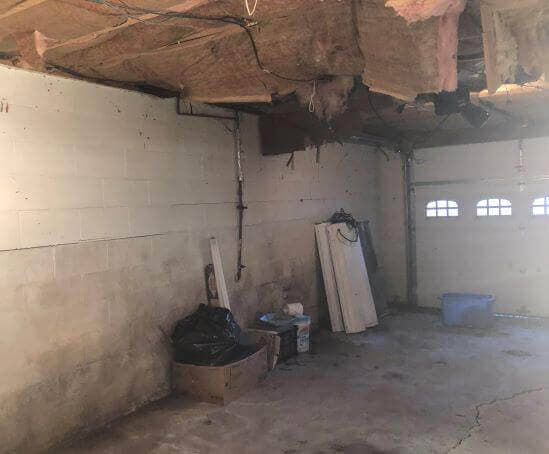
Before I write these articles, I spend a little time on Google. I like to see what information is available, if it’s helpful or just advertising, and what people are searching for. And I discovered that “garage repair” seems to automatically reroute to “garage DOOR repair.” Like the door is the only thing that could have problems!
A garage is a building like any other, and can have all of the usual building issues: leaking roof, uneven floor, water leaks, or settling foundation. Depending on where your garage is- and if it’s connected to your home- these can be minor or major problems for you.
Acculevel is a foundation repair company, and we’ve fixed tens of thousands of homes since our beginning in 1996. Our primary focus in this industry is to restore strength and stability to buildings, so you can live comfortably and confidently. If you have questions about your garage and its foundation, we have answers for you.
In this article, we’re going to address the two most common problems with a garage foundation: sinking or cracking floors and settling. We’ll also briefly explain how we can repair an underground garage, such as those under bi-level or tri-level homes.
All structures settle over time; there are no exceptions. As the ground underneath your garage adjusts to changes in weight, pressure, and climate, it affects the building on top of it. Transitioning from hot dry summers to cold wet winters can crack concrete. Heavy thunderstorms can create erosion under the slab, causing it to sink. If you replace your motorcycle with an SUV, the added weight may strain a floor already under pressure.
Once you have a sinking concrete slab, you’ll need it to be lifted back into place. There are a few different options out there, but we prefer slabjacking. It’s a clean and efficient way to raise concrete, and it sets up within minutes. The following images are a Before-and-After of a garage floor repairing with slabjacking. It’s not very clear from the photos, but the garage walls are made of cement blocks. The floor is a separately poured slab.
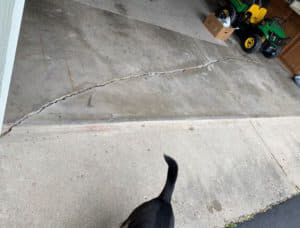 This photo was taken by an Acculevel project advisor, showing the floor has cracks across the front of the garage. The piece closest to the driveway is sinking.
This photo was taken by an Acculevel project advisor, showing the floor has cracks across the front of the garage. The piece closest to the driveway is sinking.
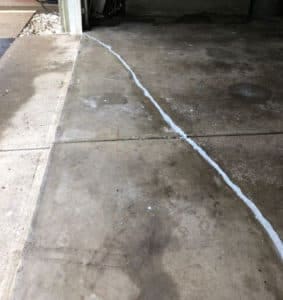 This photo was taken by an Acculevel crew member, after slabjacking and crack sealing. You can see the front half of the slab has been lifted to level with the back half.
This photo was taken by an Acculevel crew member, after slabjacking and crack sealing. You can see the front half of the slab has been lifted to level with the back half.
Sometimes, it isn’t just the floor that sinks in a garage. In the instance below, the foundation of the garage is cracking and settling. There are several cracks visible along the bottom, below the vinyl siding. When this happens, the best solution is installing helical piers. These are the same piers used to repair a house’s settling foundation, and Acculevel warranties these for the life of the structure.
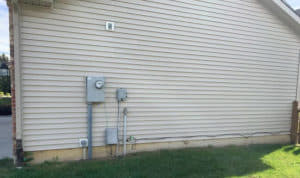 This photo was taken by an Acculevel project advisor before piers were installed. This garage is attached to the house on the other side, and the homeowners were concerned it would eventually damage the house itself.
This photo was taken by an Acculevel project advisor before piers were installed. This garage is attached to the house on the other side, and the homeowners were concerned it would eventually damage the house itself.
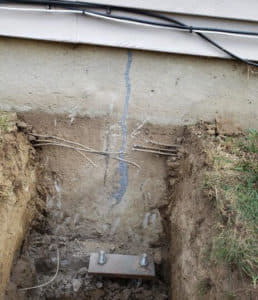 This photo was taken by an Acculevel crew member after installing piers and sealing cracks.
This photo was taken by an Acculevel crew member after installing piers and sealing cracks.
If you own a bi-level or tri-level home, your garage may be underground as part of (or instead of) a basement. In the example below, there are a number of issues with this garage. The homeowner asked us to address the bowing wall and water seeping in.
Generally speaking, we cannot install water drainage in a garage; this is because most of them are built above ground. However, since this particular garage is built under the house, we were able to accomplish both of these tasks. Because the wall had bowed more than two inches, it required wall anchors to stabilize it.
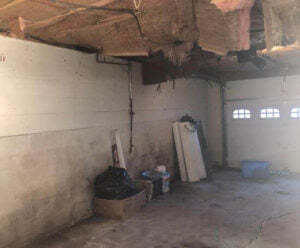 This photo was taken by an Acculevel project advisor before wall anchors and water drainage were installed. The homeowner chose to remove and replace the failing insulation himself.
This photo was taken by an Acculevel project advisor before wall anchors and water drainage were installed. The homeowner chose to remove and replace the failing insulation himself.
If so, you should find an experienced foundation company, and make an appointment. Before you sign a contract for any service, we urge you to always verify the company is reputable, insured, and accredited by the Better Business Bureau.
Is this the first time you’ve hired a contractor to work on your home? Or have you done this before, and it wasn’t a good experience? We have a checklist of questions to ask contractors, which includes a free downloadable copy for you to use. It covers everything from how to ask about price and deposits, through warranties and scheduling.
If you live in Indiana or the surrounding states, contact Acculevel. If you have noticed any problems and would like an evaluation, you can request a free estimate. An experienced project advisor will examine the areas of concern and recommend the best course of action for you, to keep your home strong and healthy for years to come.
[DISPLAY_ULTIMATE_SOCIAL_ICONS]